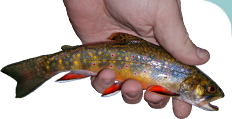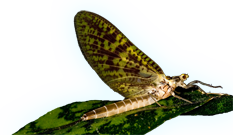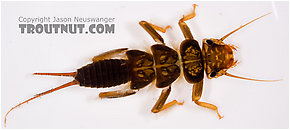Blog & Latest Updates
Fly Fishing Articles
Insects by Common Name


> > Acroneuria
The Specimen
The Discussion
| GONZO | April 3rd, 2007, 9:00 am | |
Site Editor "Bear Swamp," PAPosts: 1681 | This appears to be Acroneuria. Not sure which species. | |
| GONZO | April 3rd, 2007, 9:53 am | |
Site Editor "Bear Swamp," PAPosts: 1681 | Sorry, Jason--hasty judgement. This specimen appears to have a setal row across the occiput. Probably Paragnetina media. I'm not used to seeing a distinct "W" on the head of media, so this one threw me. But, I can't think what else it could be. (Way too dark for immarginata, and the abdomen would be patterned.) | |
| Mlajoie | March 18th, 2008, 8:49 am | |
| Posts: 6 | This may in fact be media, but Gonzo is right, the markings are usually not this distinct (especially the 'w'). To me, this looks more like a darkly colored immarginata. Differences of habitat frequently cause variations in color, and it is tough to distinguish for sure, based on the photos. Immarginata has transverse banding on the abdominal terga, and this specimine has an especially dark abdomen, making it hard to tell. Also, just to point out, Gonzo, the occipital ridge is not made up of setae. It is a closely set transverse row of spinules. And to the other comment, a golden nymph will work fine for fishing, as it's still a perlid. Besides, I don't think trout can ID to species... | |
| Entoman | March 11th, 2012, 9:12 am | |
| Northern CA & ID Posts: 2604 | Jason, This one is still linked with Acroneuria for some reason, even though the name is now correct. Two characters that nobody seems to mention are the concave look to the back of the head (caused by the occiputal ridge) and the exaggerated bowling pin shape of the abdomen on many Paragnetina. These are noticable differences from Acroneuria. When these two characters are together and obvious, there should be no need to look at spinules with a microscope or good macrophoto to determine between the two. We have a similar situation out West with Callineuria/Hesperoperla and Claassenia nymphs. Astute observers can easily tell the difference at a glance without enhanced vision, and I suspect this may also be possible between many if not most Acroneuriinae and Perlinae genera in the East. | |
| "It's not that I find fishing so important, it's just that I find all other endeavors of Man equally unimportant... And not nearly as much fun!" Robert Traver, Anatomy of a Fisherman | ||
Quick Reply
You have to be logged in to post on the forum. It's this easy:
Related Discussions
| Title | Replies | Last Reply |
| Re: Probably an immature Paragnetina media In Paragnetina media Stonefly Nymph by GONZO | 2 | Jan 19, 2010 by Dkak |
| Re: Probably Acroneuria lycorias In Acroneuria abnormis Stonefly Nymph by GONZO | 1 | Oct 28, 2008 by GONZO |
| Re: Which species is this? In Acroneuria abnormis Stonefly Nymph by Troutnut | 4 | Mar 11, 2012 by Entoman |
| Moved to Acroneuria lycorias In Acroneuria lycorias Stonefly Nymph by Entoman | 0 | |
| Re: Probably Agnetina capitata In Agnetina capitata Stonefly Nymph by GONZO | 5 | Mar 23, 2011 by Jmd123 |
| Re: Helopicus subvarians (Stonefly) common in New York waters! In the Stonefly Genus Helopicus by Walleye | 6 | Jan 9, 2014 by Entoman |
| Re: Paraleptophlebia helena (1 more) In the Photography Board by Millcreek | 13 | Aug 31, 2014 by Millcreek |
| Re: Mayfly from Chalk stream In the Identify This! Board by Stanislav | 12 | May 4, 2007 by Taxon |
| Re: Photo Request In General Discussion by Feathers5 | 4 | Mar 14, 2013 by Lastchance |
| Re: Nymph size Question In General Discussion by DrLaser | 4 | Jun 8, 2012 by Wiflyfisher |
Troutnut.com is copyright © 2004-2024 Jason
Neuswanger (email Jason). See my FAQ for information about use of my images.
 privacy policy
privacy policy


